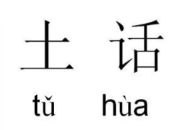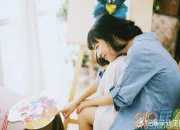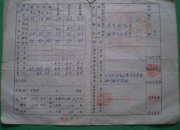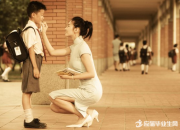高一英语《school life》课件
时间:2021-08-31一. 教学内容:
Unit 1 School life
二. 教学目标:
掌握Unit 1词汇及词性变化
三. 教学重难点:
掌握课文中的重点句型的结构、用法
Unit 1 School life
(一)词汇
attend vt. 参加,出席
earn n. 获得
respect v. 尊敬,敬重
achieve v. 取得,完成
grade n. 等级,成绩
subject n. 科目
literature n. 文学
average adj. 普通的;平均的
n. 平均数;普通
on average
an average of
cooking n. 烹饪
extra adj. 另外的,额外的
Spanish n. 西班牙语
adj. 西班牙的, 西班牙人的.,西班牙语的
etc. 等等
miss v. 想念
dessert n. 餐后甜点
dessert , desert /e/
dessert表示甜点,而desert 表示沙漠。但是desert也可以发/ i /, 这时它是作为动词,意思是抛弃,离弃。例:荒岛 a deserted island
experience vt. 经历,体验
辨析experience和experiment
experience 表示经验,经历,而experiment表示实验。注意两个单词拼法上的区别。
article vt. 文章
immediately vi 立刻,马上
(二)课文重难点
1. mean
v. 意味
What do you mean?
1)mean that +宾语从句
我是说你不需要今天就完成。
I mean you needn’t finish it today.
2)mean doing
Falling into the river on such a cold day means losing your life.
学好英语意味着花大量的时间。
Learning English means spending a lot time.
3)mean to do 计划=plan to do
I didn’t mean to hurt you.
我们本打算给你一个惊喜的。
We mean to give you a surprise.
联想1:meaning
What’s the meaning of this word? Do you know?
2. attend, take part in, join和join in
attend, take part in, join和join in都表示“参加”的意思。但是,attend 通常与meeting, lecture搭配。take part in 常常指参加一个重大的活动。join表示参加一个“组织”、“团体”等, 也可以说加入某人, join sb, 而join in表示参加一个活动。如join in (doing) sth, join sb in (doing) sth.
例:我们每天上学。
We attend school every day.
他参加了庆祝活动。
He took part in the celebration.
他在五年前参军了。
He joined army five years ago.
3. This sounded like my school in China.
sound 作动词,表示“听起来”,后面可跟形容词、like加名词,或从句。
听起来是个好主意。
That sounds like a good idea.
你的解释我听着有道理。
Your explanation sounds reasonable to me.
你的声音在电话里听起来很甜。
Your voice sounds sweet in the phone.
联想1:与sound有相同用法的词还有look, taste, feel等感官动词。
例:你穿这件蓝色裙子看起来很漂亮。
You look beautiful in this blue dress.
尝起来很美味
taste delicious
这个沙发感觉非常舒适。
This sofa feels comfortable.
联想2:sound n. 声音
sound, voice 与noise
noise指噪音,voice通常是指人的声音,sound指普通的声音。
4. used to do
表示过去常常做某事
Einstein used to be a student who is not good at Maths.
爱因斯坦曾经是一名不擅长数学的学生。
他们曾经天天在一起游泳。
They used to swim together every day.
联想1:used to do 与be used to doing
used to do表示过去常常做某事,而be used to doing 表示习惯做某事
例:我现在习惯住在中国了。
I’m used to living in China now.
我还不习惯每天这么早起。
I am still not used to getting up so early every day.
5. I usually went to the Computer Club at lunchtime, so I could e-mail my family and friends back home for free.
for free 免费的
We provide tea for passengers for free. 我们免费为乘客们提供茶。
6. Though it didn’t look like a table when it was finished, I still liked it very much.
1)though引导让步状语从句,相当于although。注意不可再用but。
例:Though he got up early, he didn’t catch the train.虽然他起得早,但没赶上那一趟车。
虽然我并不富裕,但我仍然愿意去帮助别人。
Though I am not a rich man, I still would like to help others.
2)though 可放在句末,作补充说明,意思为“不过”。
例:I got a cold, not serious though.
我得了感冒,不过不是很严重。
7. as
联想1:as…as
例:I found the homework was not as heavy as what I used to get in my old school.
我希望将来和我母亲一样漂亮。
I hope I will be as beautiful as my mother.
她不像以前那样骄傲了。
She is not as pride as she used to be.
注意:
He is as tall as that small tree. (a boy)
He is as tall a boy as that small tree.
例:We have as good a time as you have.
否定:not as… as, not so … as
联想2(1):引导原因状语,相当于because
例:This means I could get up an hour later than usual as schools in China begin before 8 a.m.
我觉得很幸运因为我所有的朋友心地都很善良。
I felt lucky as all my friends were kindhearted.
联想2(2):引导时间状语,表示“当……的时候”
随着年龄的增长,他对除了园艺外的所有事情都失去了兴趣。
As he grew older, he lost interest in everything except gardening.
【模拟试题】(答题时间:10分钟)
一、单项选择
1. Some girl students asked me to ________ them in _______ Mary a happy birthday
A. join; to wish B. attend; to wish C. join; wishing D.take part in; wishing
2. Life here is much easier than it .
A. is about to B. thanks to C. used to be D. belong to
3. She shouldn’t that gift, for it her sister.
A. accept, belongs to B. accept, is belonged to
C. received, belongs to D. received, is belonging to
4. The young man spent as much time as he over his lessons.
A. went B. has gone C. would go D. could going
5. I _______ if you’ll give me some advice on how to learn English.
A. wonder B. ask C. am puzzled D. wish
6. —Be careful! Your hair might get caught in the machine.
—Thank you. I _________ I ________ so close to it.
A. don’t know; am B. haven’t known; was
C. didn’t know; was D. haven’t known; am
7. —Why haven’t you bought any butter?
—I _______ to, but I forgot about it.
A. liked B. wished C. meant D. expected
8. They made an important decision _________ the end of the meeting.
A. in B. by C. on D. at
9. —Would you like some coffee?
—Yes, but only ________.
A. little B. very little C. a little D. little bit
10. Pop music is a great _________ with young people.
A. favorable B. favored C. favorite D. favor
二、阅读理解
Robert and Joanna like school very much. At school they can talk to their friends but Robert and Joanna cannot see their friends. They live 100, perhaps 300 miles away and like Robert and Joanna, they all go to school by radio.
Mount Ebenezer is in the centre of Australia. Not many people live in “The Centre”. There are no schools with desks and blackboards and no teachers in “The Centre”, school is a room at home with a two-way radio. The teacher also has a two-way radio. Every morning she calls each student on the radio. When all the students answer, lessons begin…. Think of your teacher 300 miles away!
11. The children in “The Centre” do not go to a school because .
A. they live too far away from each other
B. they do not like school
C. they are not old enough to go to school
D. their families are too poor
12. In order to send their children to school, parents in “The Centre” of Australia need to provide _________.
A. a desk B. a car
C. a school room at home D. a special radio
13. Teachers in “The Centre” of Australia teach .
A. not in a classroom but at the homes of the students
B. by speaking only and not showing anything in writing
C. without using any textbooks or pictures
D. without knowing whether the students are attending
14. When children are having a lesson, they can hear their teacher, .
A. but their teacher cannot hear them
B. and their teacher can hear them too
C. but cannot hear classmates
D. and see him or her at the same time
【试题答案】
一、1—5 CCADA 6—10 CDDCC
二、11、A 12、D 13、B 14、B
【高一英语《school life》课件】相关文章:











